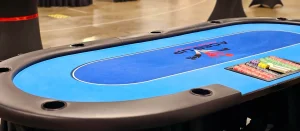The Importance of Table Talk in Poker
3 min read
Table talk is an integral component of poker strategy, offering players a chance to gather intelligence and deceive opponents. However, it’s imperative that all parties involved adhere to proper etiquette so as not to compromise an ongoing hand or cause unnecessary drama at the table.
Asking questions of your opponents and reading nonverbal cues are effective ways of gathering intelligence about them, while analysing non-verbal gestures may reveal hand strength or intentions.
1. Listen to Your Opponents
Poker can be an exciting game that allows its participants to learn and grow; however, its inherent risk can create tension for those prone to financial swings or with gambling issues.
Learning how to listen is crucial for effective table talk. Spotting moments where vocalizing your thoughts could reveal valuable information on the state of their game or their thoughts about your opponent.
Questioning an opponent about which kind of hand they prefer playing can give an insight into their level of comfort and ability. Furthermore, consistent table talk helps prevent opponents from reading tells from speech patterns alone while providing an opportunity to introduce doubt and manipulate emotions effectively in high-stakes games. This approach has proven particularly effective.
2. Communicate Effectively
Poker is a game of skill in which players use conversation as a weapon to gather valuable intelligence on their opponents. By actively communicating and being aware of body language, it’s possible to decode opponent intentions, gauge hand strength and employ verbal misdirection for maximum impact.
Table talk goes beyond spoken language to include nonverbal cues that reveal emotional states and thought processes of players at a table. A shoulder shrug could indicate feelings of confidence or uncertainty and could impact your decision-making process.
Financial concerns can often become an area of contention between players, particularly when playing high stakes games. Open communication and having an organized plan in place that prioritizes family, friends, and personal interests can alleviate such worries without disrupting gameplay.
3. Maintain a Respectful Demeanor
Poker can be an arduous game to master, and table talk is one of the many skills that set apart good from great players. Chit-chat requires striking an effective balance between being informative and entertaining in order to succeed at this art form.
Maintaining composure and using an appropriate tone of voice can sway opponents’ decisions and reveal tells through verbal communication. Maintaining a consistent talking pattern regardless of hand strength helps avoid opponents reading body language or picking up on betting patterns; verbal commentary that creates doubt or misdirection may also work to your advantage, often confusing opponents into betting more aggressively or goading them to commit further bets.
4. Engage in Conversations Off the Table
Though many poker tournaments prohibit player talk, most skilled players understand its value in adding an engaging social dynamic to the game and drawing in more diverse audiences. Furthermore, conversation gives one insight into opponents and can even help one strategically misdirect them.
Reading nonverbal expressions and betting patterns can provide players with insight into their opponents’ hand strength and intentions, which allows them to use table talk strategically and adapt their own strategies accordingly. A balanced approach to table talk is necessary as inconsistent verbal or betting patterns could give their opponent’s enough information for countering strategic intentions – thus necessitating eliciting actionable information while exploiting opponents perceptions or tendencies for success in high stakes poker games.
5. Be Mindful of Your Tablemates’ Personalities
Players at the poker table often engage in conversations. Some may do it more often than others and this can sometimes be beneficial.
But it’s important to keep in mind that talking too much can reveal too much and result in penalties from tournament officials. Also, engaging in offensive actions or breaking poker rules shouldn’t be done unwittingly.
Skilled poker players understand how to utilize conversation as a means of gathering information and misdirecting opponents. For instance, they could ask a question that makes their opponent question their hand strength or alters their strategy accordingly – this technique can be seen used frequently at higher-level poker games.






